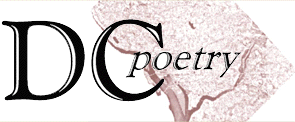Because I have injured my back, I must sit here, half way out
on the hard stoop, with the hard wall to hold me up. Over the fields
and treetops, a flock of starlings changes to scattered dots, and then
to a dense blackness, turning. Everyone else is out on the lawn--
dog, husband, beetles, and the agitated mockingbird, defending
its wild grape vines. Unnoticed, except (I flatter myself) by me,
a fall warbler is also here, going up and down the ladder
of the oak, safe in its drab suit of feathers.
All this is a lie. I saw the warbler yesterday; the dog
is lying right here beside me on the cement; my husband is
inside, asleep. So the beetles are holding court, I assume,
in peace. The starlings do drive everyone crazy, especially the mockingbird,
with their noise and selves; and my back does hurt, though the truth is
I injured it years ago. The fields are here--their green
as problematic as the worst Manet, made up with touches
of blue and yellow, of purple, light, and small revelations
of orange. I do not even count the motions of wind.
Nor would I mention the army, hunched and disheveled,
crossing the autumn field. I know better than to insist
that though the sun is shining, a cloud of rain attends them.
As off the stoop a woman rises, gathers her skirts absent-
mindedly in one hand, and starts toward them--
till stopped by the barbed-wire fence, a thing she has never seen.
She stands there now, bare feet and ankles showing
immodestly to those men. I would never say such a thing.
So she sits down. She covers herself. And, lifting eyes to heaven,
watches starlings explode in wind. Let us leave her there.
Let us concentrate on the mockingbird, which is, I assure you, real.
It flutters now on the holly tree, loud but not singing its song--
I mean its own song, the one it did not learn outside itself.
I hear, instead, a robin. I hear the low complaint of a weanling calf. I hear the warbler
when it was young and gay in yellow feathers. I hear the moon
pass gravely over the top of the oak behind me. And I place the feet
of the mockingbird, rustling but precise among the sharp leaves of the holly.
In this way I put you at ease. In this way I convince you that all
this time I have been sitting on the stoop with my head in my hands.
That around me the sun does not ruin the fields, painting blood
on the side of every blade of grass. That purple does not
pool under yellow, filling the tracks I will not describe through green.
How easy it is to write "the weanling calf." How riotously
the wild grape vines run over the barbed wire fences, as woodenly
she dances, holding her skirts, treading not a single beetle. How easy to say
this is not music, this sound of marching, the shrill contention
of birds filling the trees. I do not know whether my husband wakes
inside. The dog gets up, I tell you, the mockingbird spreads
its distracting wings, the warbler flies. I tell you the cloud
of rain rains pink and blue and gold and ice. I tell you there is
no oak tree in my yard. I tell you we are passed by. It is not by much.
She stands at the fence, and I want you to see it tremble.
Imagination has nothing to do with it, as I wave my arms
and the wild upthrust of starlings turns at once
to a black fist moving toward us, or away, in sky.
["Weeping" appeared in Five Fingers Review 11, After the Postmodern: The New Lyric and Shifting Narratives, 1992.]

